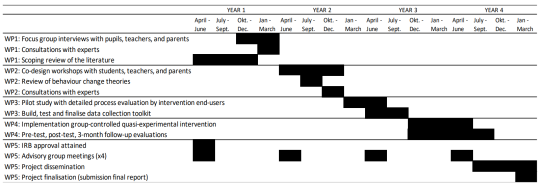Abstract
Mental health problems are one of the main contributors to the global burden of disease in young people. According to the WHO, 1 in 7 adolescents experience a mental disorder (e.g., depression, anxiety). Moreover, up to 20% of school-going youth have engaged in non-suicidal self-injury (NSSI). These prevalence rates have doubled since the COVID-19 outbreak. This mental health burden is considerably greater in Urban youth, compared to peers in rural settings. These sobering numbers highlight the need for the development and testing of (preventive) mental health interventions for adolescent youth. The current project is thus timely and highly important as it aims to develop an evidence-informed multilevel and multicomponent school and sport-based mental health program for adolescents. The project aims to promote mental health by (a) increasing mental health literacy, (b) strengthening resilience, and (c) preventing psychological symptoms (such as depression, non-suicidal self-injury and suicidal thoughts). To contextualize the intervention to the Brussels Urban context and maximise uptake and impact, a Participatory Design (PD) approach will be adopted. With this project we aim to tackle SDG3: Promoting good health and well-being in youth.
Research objectives
The current project aims to co-design a comprehensive novel evidence-informed school-sport-based mental health programme, developed with and tailored at pupils (aged 13-15) within the Brussels urban context. The specific objectives set out in this project include:
- Co-design a multicomponent (i.e., mental health literacy, resilience development, prevention NSSI) mental health programme for pupils, integrating sport sessions with class-based session, and complemented with educational modules for teachers and parents;
- Explore how this entire mental health programme can be implemented most effectively within the Brussels school system;
- Conduct preliminary process and outcome testing of the entire mental health programme.

Work plan
Work package 1
The first work package will encompass the IDENTIFY and DEFINE research stages. Key activities and milestones within this work package include:
- Focus group interviews with pupils, teachers, and parents; focus groups will be conducted to (a) understand the problem from the perspective of the end-users and (b) help define objectives to address this given problem.
- Consultations with experts; consultations will be conducted to understand the problem from the perspective of applied and academic experts.
- Scoping review of the literature; a scoping review will be conducted to (a) evaluate epidemiological evidence and (b) identify risk factors and resources for adolescent mental health.
Work package 2
The second work package will encompass the POSITION and CONCEPT research stages. Key activities and milestones within this work package include:
- Co-design workshops with pupils, teachers and parents; co-design workshops will be conducted to understand how the intervention needs to be positioned from the perspective of the end-user and generate intervention content.
- Review of behaviour change theories; a brief literature review will be conducted on leading behaviour change theories which can aid in the design of engaging evidence-informed intervention content.
- Consultations with experts; consultations with experts will be conducted to establish key indicators to evaluate the intervention process, impact and outcome, based on content developed during the co-design workshops.
Work package 3
The third work package will encompass the CREATE research stage. Key activities and milestones within this work package include:
- Pilot study with detailed process evaluation by intervention end-users; a detailed pilot study will be conducted to test the intervention with a small sample of end-users.
- Build, test and finalise data collection (quantitative & qualitative) toolkit; a toolkit will be developed and tested during the pilot study, based on the established indicators for intervention process, impact and outcome (see WP3).
Work package 4
The fourth work package will encompass the USE research stage. Key activities and milestones within this work package include:
- Implementation group-controlled quasi-experimental intervention; a quasi-experimental intervention will be conducted, randomly allocating participants at group level (i.e., class) to either experimental or control conditions. The experimental condition will receive the intervention over a six-month period, whereas the control group will serve as a ‘usual care’ control group. Additionally, a selected sample of teachers and parents of pupils within the experimental group will be provided the complementary educational modules.
- Pre-test, post-test, 3-month follow-up (quantitative & qualitative) evaluations; a three-wave data collection design will be adopted to collect both qualitative and quantitative data on intervention process, impact and outcome. These include pre-test, post-test, and threemonth follow-up data collection points.
Work package 5
The final work package includes all project management and dissemination activities. Key activities and milestones within this work package include:
- Attaining IRB approval; institutional ethics approval will be obtained from the Medical Ethics Committee of the Vrije Universiteit Brussel by the start of the project, as well as the finalisation of the Data Management Plan.
- Advisory board meetings; an advisory board will be installed and consulted once per project year to present study progress, discuss any unforeseen issues or delays, and (when needed) discuss optimal ways to remain on or return to schedule. The advisory board will consist of the three project (co-)promotors as well as a representative from each of the three project partners (Go! Scholengroep Brussel, CLB Brussel, Gezond Leven).
- Project dissemination (publication; dissemination to policy makers, etc.); within the project we aim for a minimum of three publication in high-level international peer-review journals (at least one Open Access). Additionally, results from the study will also be disseminated to a broader audience, including policy makers, to ensure broad uptake and sustainability of the project findings beyond the project duration.
- Project finalisation (submission final report); a final project report will be submitted in the last quartile of the final project year

